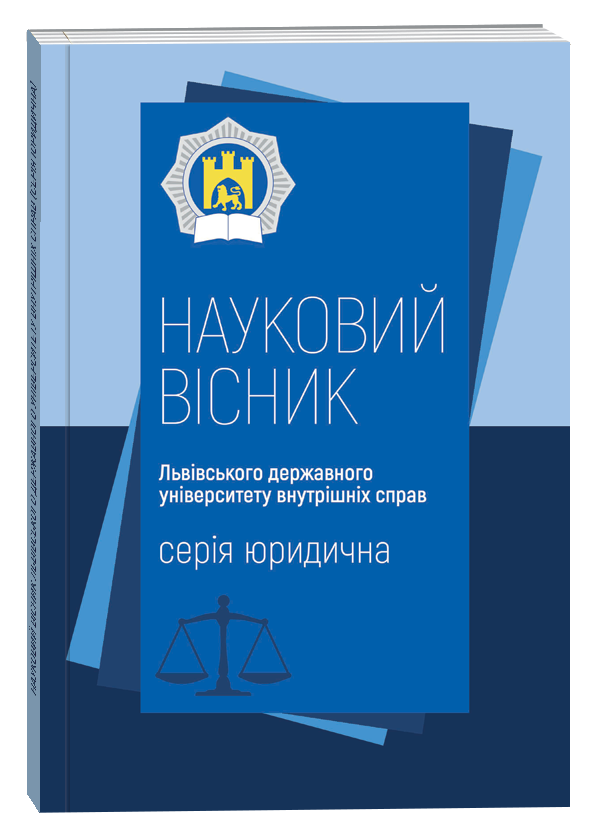SOME FEATURES OF CYBER CRIMES INVESTIGATION
DOI:
https://doi.org/10.32782/2311-8040/2024-3-9Keywords:
cybercrime, cybercrime investigation, digital evidence collection, evidence analysis, international cooperation, digital forensicsAbstract
In today's world, where information technologies are integrated into all spheres of life, cybercrimes are becoming more and more common and complex. These include identity theft, financial fraud, hacking of information systems, distribution of malicious software and other forms of criminal activity in cyberspace. The purpose of the article is to highlight the main aspects and challenges related to the investigation of cybercrimes. The article analyzes the latest scientific publications of Ukrainian and foreign authors investigating various aspects of cybercrime, including legal, technical and organizational aspects. Cybercrime is classified into several main categories such as data theft, financial fraud, hacking attacks, malware distribution and cyber terrorism. Conditionally, a criminal offense can be classified as a cybercrime if it is committed using computer systems or telecommunication networks. The main part of the article is devoted to the methods of investigating cybercrimes, which include several stages: detection of the crime, collection of evidence, analysis of evidence, identification of perpetrators and prosecution. Crime detection can be achieved by monitoring network traffic, analyzing logs and using intrusion detection systems. Evidence gathering involves collecting digital traces such as files, email, event logs, and evidence analysis involves examining the collected data to uncover key information. Identifying the perpetrators is a complex task that requires analysis of network data and cooperation with other law enforcement agencies. Prosecution requires careful documentation of all evidence collected and compliance with procedures required by law. The importance of compliance with international standards and the use of modern technologies for the effective investigation of cybercrimes is emphasized. This includes the use of specialized software for the collection and analysis of digital evidence, the training of digital forensics specialists and collaboration with other law enforcement agencies internationally. Thanks to this, it is possible to achieve a more effective countermeasure against cybercrime and ensure security in cyberspace.
References
Кравцова М.О. Сучасний стан і напрями протидії кіберзлочинності в Україні. Вісник кримінологічної асоціації України. 2018. № 2 (19). С. 157. URL : http://dspace.univd.edu.ua/xmlui/handle/123456789/3848.
Савчук Н.В. Кіберзлочинність: зміст та методи боротьби. 2009. С. 338–342. URL : http://tppe.econom.univ.kiev.ua/data/2009_19/zb19_48.pdf.
Чернишов Г. М. Кіберзлочинність як виклик глобалізації та загроза світовій безпеці: теоретичні основи дослідження. Прикарпатський юридичний вісник. 2018. № 3. С. 158–162.
Кравцова М.О., Литвинов О.М. Запобігання кіберзлочинності в Україні : монографія. Харків : Панов, 2016. С. 19.
Sinha Aditya, Singla Kunal, Victor Teresa Matoso. Artificial Intelligence and Machine Learning for Cybersecurity Applications and Challenges. Journal of Information Security, 2023. Vol. 15 No. 3. https://doi.org/10.4018/978-1-6684-9317-5.ch007.
Raghavan Sriram. Digital forensic research: Current state of the art. CSI Transactions on ICT. 2012. 1. https://doi.org/10.1007/s40012-012-0008-7.
Amoo Olukunle, Atadoga Akoh, Abrahams Temitayo, Farayola Oluwatoyin, Osasona Femi, Ayinla Benjamin. The legal landscape of cybercrime: A review of contemporary issues in the criminal justice system. World Journal of Advanced Research and Reviews. 2024. 21. P. 205–217. https://doi.org/10.30574/wjarr.2024.21.2.0438.
Abdelwahab Ihab, Ramadan Nagy, Hefny Hesham. Cybersecurity Risks of Blockchain Technology. International Journal of Computer Applications. 2020. 177. P. 8–14. https://doi.org/10.5120/ijca2020919922.
Scanlon T. Cybersecurity of Quantum Computing: A New Frontier. Carnegie Mellon University, Software Engineering Institute's Insights (blog), Accessed July 24, 2024. https://doi.org/10.58012/rzmt-m258.
Aldowah Hanan, Rehman Shafiq, Umar Irfan. Security in Internet of Things: Issues, Challenges, and Solutions. 2019. https://doi.org/10.1007/978-3-319-99007-1_38.
Біленчук П.Д., Зубань М.А. Комп’ютерні злочини: соціально-правові і кримінолого-криміналістичні аспекти : навч. посібник. Київ : Українська академія внутрішніх справ, 1994. С. 6.
Закон України. Про основні засади забезпечення кібербезпеки України. 05.10.2017 року № 2163-VIII. URL: https://zakon.rada.gov.ua/laws/show/2163-19#Text









